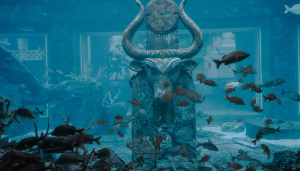7 things you probably didn’t know about the lost city of Atlantis
(Collective Evolution | Alanna Ketler) Atlantis, the intriguing mystery that leaves many of us curious to learn more, and some of us skeptical and dismissive. What is it about this lost city that leaves so many of us questioning much of what we have been taught to believe? Is there some truth to the story of Atlantis that we inherently know, deep down inside that is true? Are we connected in some way to this mythical place from, perhaps our past lives?
These questions are fun to ponder, but we are unlikely to get any definite answers, at least not yet.
First, some history
How much do you know about Atlantis? Where does this story even come from? From what we do know, the first known documentation of the story of Atlantis came from the Greek philosopher, Plato in two of his writings, Timaeus and Critias, both these books date back to about 360 BC. Within these books, Plato wrote that the Greek sage, Solon was given the story of Atlantis in Egypt by a priest and upon his arrival back to Greece, he shared the story with his relative, Dropides who passed it down to his son Critias, who then passed it down to his grandson – also names Critias, who then finally shared it with the well-known Greek philosopher, Socrates.
So, given the above information, you can see that this was a story that was told, and passed down through many generations, therefore it should not be taken as fact. Despite of this, for some reason many of us feel a strong connection to the story of Atlantis and believe it to be true.
In the report, author M. Pierre Termeir, a member of the Academy of Sciences and Director of Service of the Geologic Chart of France, gives a lecture regarding the Atlantean civilization. He makes a compelling case for further study of this lost city:
After a long period of disdainful indifference, observe how in the last few years science is returning to the study of Atlantis. How many naturalists, geologists, zoologists, or botanists are asking one another today whether Plato has not transmitted to us, with slight amplification, a page from the actual history of mankind. No affirmation is yet permissible; but it seems more and more evident that a vast region, continental or made up of great islands, has collapsed west of the Pillars of Hercules, otherwise called the Straight of Gibraltar, and that its collapse occurred in the not far distant past. In any event, the question of Atlantis is placed anew before men of science; and since I do not believe that it can ever be solved without the aid of oceanography, I have thought it natural to discuss it here, in this temple of maritime science, and to call to such a problem, long scorned but now being revived, the attention of oceanographers, as well as the attention of those who, though immersed in the tumult of cities, lend an ear to the distant murmur of the sea.
You can read this full report here, starting on page 219.
Regardless of how you feel about the lost city of Atlantis, here are 7 things you probably didn’t know…
1. We know the supposed location
In Plato’s writings, he tells us exactly where the lost city lies, his text reads, “came forth out of the Atlantic Ocean… there was an island situated in front of the straits which are by you [in reference to the ancient Greeks], called the Pillars of Heracles.” Today, these are known as the Straits of Gibraltar, the area between Spain and Africa.
In 2011, archaeologist from the University of Hartford, Richard Freund and his team found cities that were built in the image of Atlantis known as “memorial cities.” They were found in the swamps of Doana National Park, which is just North of Cadiz Spain. Interestingly Cadiz sits right outside of the straights, which has Freund convinced that the real Atlantis was buried in the mud flats of the Atlantic. This matches the part of Plato’s story that says, “the sea in those parts is impassable and impentrable, because there is a shoal of mud in the way; and this was caused by the subsidence of the island.”

2. The city of Atlantis was named after a demigod
Despite the fact that Atlantis is apparently in the Atlantic ocean, that’s not where it got it’s name. According to the texts, Poseidon – the Greek god of the sea – had five pairs of male twins with an Atlantean woman, named Cleito. Poseidon gave each of his 10 sons a different portion of the island to rule. His first-born Atlas had the entire island and the surrounding ocean named after him.
3. We are missing half the story
While we have a complete version of Timaeus, we do not have the completed copy of Critias. In this story we have up until Zeus, head of all Greek gods. “Collected all the gods into their most holy habitation, which, being placed in the center of the world, beholds all created things. And when he had called them together, he spake as follows” and that’s where it ends, talk about leaving you on the edge of your seat! Who knows, maybe this next portion of the book was deliberately left out… it is not known whether Plato did this on purpose or if we just never were able to find the completed version. There is also a belief that Plato either wrote or had planned on writing a third book about Atlantis called Hermocrates.
4. If Atlantis were real, it would be at least 11,500 years old
As the text goes, the story of Atlantis was handed to Solon in Egypt after he wanted to draw one of the priests to speak about their oldest of tales. In order to do this, Solon told the priests of the oldest Greek story what he could recall and spoke to them about the great flood and the first man. One priest responded, “O Solon, Solon… there is not an old man among you… in mind you are all young; there is no old opinion handed down among you by ancient tradition.“
The priest continued to say that the home city of Solon, Athens was actually much older than he thought it was.
5. Plato believed the story to be true
Even though, aside from hearsay, this story doesn’t really have any solid legs to stand on in terms of physical evidence, Critias claims that this story is in fact, true, “Then listen… to a tale which, though is strange, is certainly true, having been attested by Solon.” To which Socrates responds, “Very good, and what is this ancient famous action of the Athenians, which Critias declared, on the authority of Solon, to be not a mere legend, but an actual fact?”
6. Atlantis was an empire
In the story told by Plato, he tells us that Atlantis was an empire, “Now in this island of Atlantis, there was a great and wonderful empire which had rule over the whole island and several others, and over parts of the continent, and, furthermore, the men of Atlantis had subjected the parts of Libya within the columns of Heracles as far as Egypt, and of Europe as far as
Tyrrhenia is another name for Eturia, which is now simply known as Central Italy.
7. Atlantis represents just one of many times mankind has been & will be destroyed
The Egyptian priest told Solon that none of his stories were actually “truly ancient” compared to his own. He claimed that the reason that Solon lacked true ancient knowledge is because mankind has been destroyed time and time again.
“There have been, and will be again, many destructions of mankind arising out of many causes; the greatest have been brought about the agencies of fire and water, and other lesser ones by innumerable other causes. When, on the other hand, the gods purge the Earth with a deluge of water, the survivors in your country are herdsmen and shepherds who dwell on the mountains.”
There are many philosophers and spiritual teachers that believe that humankind has been wiped out before and will be wiped out again. Some believe this for a simple reason of science and or natural disasters, others believe this is sort of like a cleansing process for us to start again if we have headed on a path of destruction. I mean think about it, the way we are heading now, in regards to how we are treating our environment, there is a chance that we could wipe ourselves out yet again, unless we learn from our mistakes and change our ways.
Source: Collective Evolution
You may also like:




